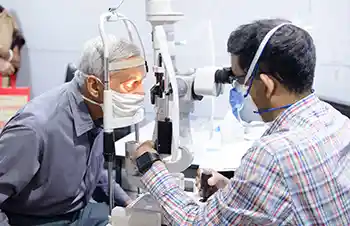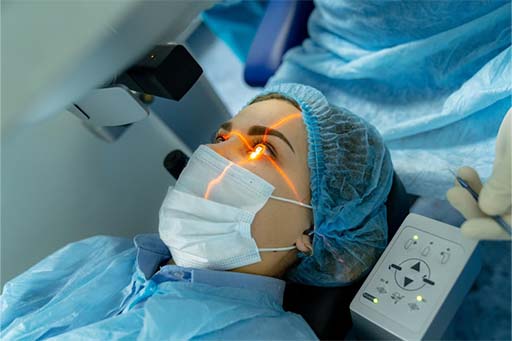Since December 2019, COVID-19 has become a serious global pandemic caused by transmissible severe acute respiratory syndrome coronavirus 2. It has powerful health implications of unprecedented magnitude. The diagnosis has been focused on severe respiratory complications, whereas there are several ocular implications that are emerging as a result of covid-19. A myriad of treatment strategies is currently under investigation.
Eye complications caused by COVID-19:
- Ocular surface and cornea (Conjunctivitis)- Conjunctivitis is the most common ophthalmic manifestation in covid-19 patients. A large number of patients with mild covid-19 infection are reported to have conjunctivitis. The symptomatic patients have been reported with redness of one or both eyes. The signs of covid-19 conjunctivitis are similar to that of other viral forms. Conjunctivitis can be resolved with lubricants and preservative-free moxifloxacin eye drops.
- Diabetic Retinopathy- Due to to the global coronavirus outbreak, several countries around the world have adopted isolation and Quarantine policies in order to ensure your social distancing. Physical inactivity may be harmful to patients. The reduction of physical activities in healthy adults can lead to impaired insulin sensitivity and slower lipids metabolism. In several cases, it may result in an increase of visceral fat and decreasing lean body mass and worsening cardiovascular performances. All these may result in the onset of diabetes mellitus leading to serious eye complications related to diabetes.
- Retinal findings- Retinal changes are also reported to be associated with covid-19 infection. Several covid-19 patients have been presented with ocular complaints of floaters and reduced vision. Covid-19 can result in retinal changes, including peripheral retinal haemorrhages, macular hyperpigmentation, retinal sectoral pallor etc.
- Neuro-Ophthalmological complications- The intricacies of covid-19 include polyneuritis, meningitis, encephalopathy and encephalomyelitis. Papillophlebitis is also an uncommon condition that can be reported in a covid-19 patient. The symptoms of the disease are unilateral, painless slight diminution of vision. Neurotropism of the virus has been reported as one of the mechanisms for neuro-ophthalmic and neurological manifestations.
- Ocular complications- Surface disorders are the most common ocular complications in ICU patients. ICU patients develop several risk factors for surface disorders. Muscle relaxants and sedating agents lead to lagophthalmos. The continuous airway pressure and oxygen masks can have a drying effect on the ocular surface. Conjunctival chemosis is a common problem seen in ICU patients, which can be severe and result in reduced ocular surface lubrication. Intensive care and invasive mechanical ventilation can be associated with serious ocular complications.
Documentation of surface disorders are extremely common, and following proper protocols can significantly reduce such incidents.
Treatment and Management
Conjunctivitis in covid-19 patients is unlikely to be of long-term clinical importance thus can be administered and treated with the use of ribavirin eye drops. Covid-19 conjunctivitis is self-limited and can be treated with symptomatic care. Patients with no symptoms of eye pain, decreased vision, or light sensitivity can be cured with frequent preservative-free artificial tears are lubricating ophthalmic ointment. Ophthalmic manifestations vary in terms of presentation, severity and timing. The ophthalmic features can develop at any point in the course of the disease. Several studies establish risk factors for ophthalmic vascular occlusions in covid-19 patients, which can develop an anticoagulation prophylaxis regimen. Thus it is important to keep ophthalmic implications in mind. The rapid increase of the covid-19 pandemic has created several challenges for the public as well as health care professionals around the globe. The management of the disease and patient has changed, also from an ophthalmologist point of view. The therapies implied to treat covid-19 patients are likely to be of ophthalmological interest too. Therefore get your eyes examined and cured by the best eye specialists in Kolkata as it is essential for us to dedicate our maximum effort to treat and cure patience to the best of our abilities, especially in the time of global medical emergency.










